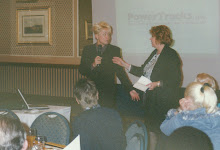The under-40 set doesn’t have a thing on the 40+ group when it comes to getting the job done. Of course, there is that odd under-40 that can do something pretty spectacular in their career but they are few and far between. (My friend’s daughter, Andrea, in her 20’s, is one of those whiz kids; she can sell ice to Eskimos – I know, cliché, but hey, as I write, it’s not even 8 am on a Saturday so give me a break.) Yet, have you noticed in job postings, typically under “Requirements” or “Qualifications”, at the very bottom of the ads, where a company requests: “Minimum 3-5 years experience”, “B.A./B.S. plus 1 year experience”, or, my personal favorite: “1 year of successful sales (or marketing, finance, etc., etc.) experience”? Do I get to pick the year?
I am beginning to wonder if these job postings are not shills planted by the government to assure the 14.5 million+ unemployed that there are jobs out there – it’s just that you’re not getting yours. Probably because you have 6 years of experience.
I did a little research on ROI (for the under-40, that means “return-on-investment”; not to worry, this info comes with experience) when companies hired “seasoned” workers as opposed to those who still need to ripen. An interesting study on the aging workforce comes from the University of Vermont School of Business Administration (wait a minute, isn’t that where there are a lot of under-30’s?) where they examined the Days Inn hotel chain and their hiring practices. The hotel chain realized a much greater ROI from hiring older workers, those over 40, versus younger workers. They found that older workers were more accurate in their work, demonstrated greater loyalty, and had lower absenteeism rates. In fact, and according to the study, the cost to recruit and train an older worker was only 35% of that spent on younger workers, $618 vs. $1,752. Now that’s not small potatoes.
Alright, so self-justification and a buck thirty (or four bucks) will get you a cup of coffee, as they say. So, what to do if you’re over 40 and trying to position yourself for a new or existing career and you have more than 3 years experience (or, one terribly successful year as some employers want)? Start talking math. That’s right. Companies want to know what you can do for them that is going to make them a whole lot o’ money. And I don’t care how much you hated math in school. A sure-fire way for employers to sit up and take notice is when a job candidate can justify, in dollars, why they should be hired over someone who can’t.
There ain’t nothin’ like experience.
Executive Onboarding Note: The Importance Of The Confidence To Be Open To
Help
-
While executive onboarding, get help. If it’s offered, take it. If it’s not
offered, find it.
The post Executive Onboarding Note: The Importance Of The C...
7 years ago



